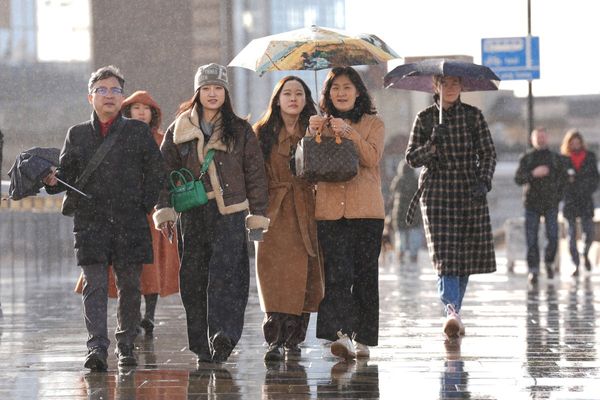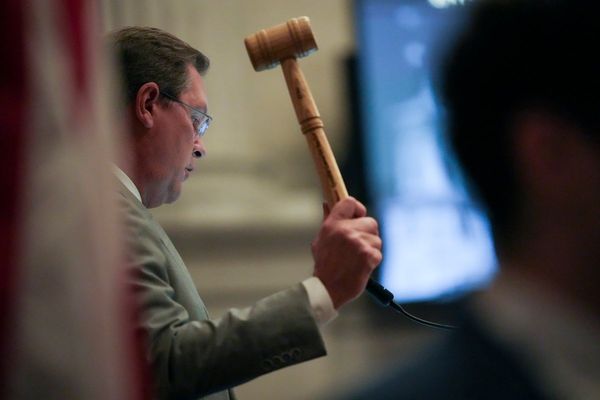
In the summer of 1976, the television presenter and Yamatji man Ernie Dingo and the Noongar/Yamatji musician Richard Walley performed what they claim was Australia’s first contemporary welcome to country – a ceremonial act in which traditional owners welcome people to their land.
I speak to Dingo and Walley two days before they perform a welcome to country at the live music extravaganza Home, for Perth international arts festival, of which Walley is also associate director. He gives me a quick preview, translating his Noongar words into English as he goes:
May the good spirit watch over you. You’re looking at the land of my people, we call Whadjuk. Later on when you go home to your country, may the good spirit take you safely home. May the spirits of my people and the spirits of your people watch over us now.
Welcomes to country between Indigenous Australian communities have a history of thousands of years, but Dingo and Walley say theirs their’s was the first to be performed in the country for non-Indigenous Australians.
Back then, Dingo and Walley were part of the Middar Aboriginal theatre, with a show billed at Perth fringe festival. They were asked by a group of Polynesian performers – two Māori and two Cook Islanders – to give them a welcome to country, as their spiritual beliefs dictate. After consulting with his community’s elders, Walley was given permission to welcome the visiting performers.
Dingo says before that occasion, “We couldn’t do it to white people because they wouldn’t understand, and there was too much negativity.”
It was the beginning of a beautiful new tradition for the nation. In the years that followed, others in Australia began asking Walley for a welcome to country, including the Northern Territory Tourist Bureau for a travel show in Perth and the Miss Universe Pageant. With Walley touring the country as a musician, he would often invite locals Indigenous Australians to the stage to perform a welcome.
A new precedent was set in 2008, when the official opening of Australia’s federal parliament began, for the first time, with a traditional welcome to the country, becoming a standard feature thereafter. The following day the then prime minister, Kevin Rudd, gave an historic formal apology to Australia’s Indigenous people.
The Ngambri elder Matilda House-Williams presented Rudd with a message stick and explained that a welcome to country “acknowledges our people and pays respect to our ancestors, the spirits who created the lands. This then allows safe passage to all visitors. For thousands of years our peoples have observed the protocol. It is a good and honest and decent and very human act to reach out to make sure everyone has a place and is welcome.”
Not long after, Walley noticed the welcome to country began to spread and took on a life of its own. These days it is a common practice at public events in Australia, from big ticket to small. And like the welcomes of old, these welcomes continue to differ from land to land – sometimes spoken in a traditional language, and including a smoking ceremony and musical or dance performances.
Between them, Walley and Dingo have welcomed such dignitaries as the Queen, musicians Stevie Wonder (who apparently took such a liking to Walley’s digeridoo it was gifted to him), Sting and Kiss to their lands. “Still remember Kiss because we were painted up like they were!” says Dingo, chuckling.
He says he has seen some welcomes to country that would “blow your brains out”, highlighting ceremonies by the Wurrundjeri woman Joy Murphy for tje AFL’s annual Indigenous Round at the MCG, and in Arnhem Land where traditional dance practices remain strong and “the old people got a chance to show off the old stuff”.
In performing a welcome to country, Walley says ancestral spirits and spirits of the land are invoked “to watch over our guests and our visitors while they’re in the country”. It is a permission to visit, he says, not unlike a stamp or visa for your passport.
Similar customs can be found around the world, be it a traveller’s prayer in the Christian faith or the gifting of a lei in Polynesian cultures. Across the Pacific, a Māori welcome, called a pōwhiri, involves dancing, speeches, singing and the famed hongi, where two people press their noses together.

Dingo says a welcome confers responsibility, not only on the guests but on those who have welcomed them. “If Richard welcomed you to this country here, you can do anything you like – [but] you muck up? Everyone else will flog him, not you. They’ll flog him because he’s responsible for you, all right?”
And it becomes Walley’s duty, having taken the visitors under his care, to educate them of the land’s conventions, including sacred totems that must not be desecrated. “If it’s a tree or an animal or a bird or a fish – you kill it in front of another mob, it could be one of that mob’s totem!”
The convention speaks to the importance of the collective in Indigenous Australian culture, Walley says, where everyone – even strangers – are situated into an intricate social structure, and accountability is shared among individuals.
In contrast to a welcome to country, an acknowledgement of country is spoken by outsiders (be it Indigenous or non-Indigenous Australians) and pays respect to the traditional custodians of the land.
As a visitor to Perth, situated on the lands of his Noongar people, I ask Walley how should I show my respect.
He asks, “if you go into someone else’s house, how do you react?”
Perhaps knocking on the door, I offer.
Dingo nods: “There you go.” Like a door knock, an acknowledgement of country is a simple and courteous way to alert someone of your presence.
Acknowledgement of country is typically worded: “I would like to show my respect and acknowledge the traditional custodians of this land, of elders past and present, on which this event takes place” – although there is, in fact, no set protocol.
Dingo says traditionally, if you were visiting the sparse mid-west country of Western Australia from which his people hail, you would first head up to a vantage point, perhaps a hill, and light a fire. “That plume of smoke would indicate that you had been sitting there. That’s just like the knock on the door.
“You could be there for a day, you could be there for a week – until they’ve [worked] you out. They’ll know you’re there. They’ve seen the fire and when they’re ready they will send some young blokes up to get you.”
From there you should lay any weapons on the ground in front of you and walk over them to indicate your peaceful intention, he says. “Until you’ve had a feed, sat down, you was looked after – then the boss would talk to you. After you’ve settled down, that was acceptance.”
Dingo brushes off accusations that the welcome to country has become an empty gesture or, worse, a form of tokenism. For him the ancient ceremony has the same religious purpose and spiritual weight as attending church. “You can’t kill spirituality. You can’t take somebody’s soul. You can’t kill the presence, the inner sanctums of spirituality. You can’t do that.”
Walley says: “This is not saying you don’t belong here or this is my country. What it’s saying is that my ancestors have been here for 2,000 generations. You may be five or six, but you’re not even 10 yet.”







